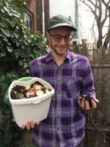Nice Compostable Cup… How About the Top?
Behold the Ecotainer, the compostable cup. Behold the lid, which will never compost...ever. Maybe I'm just being a jerk, but this is what I'd call a mixed message. Maybe they just ran out of their normal wax paper lid that day and had to default to crappy plastic. Maybe the preferred non-plastic lid cost more. Maybe the paper cup cost more than they wanted it to...which leads me to my first point: I hope the cost of the cup didn't break the bank. There's plenty of paperboard cups on the market that don't say anything about being compostable, even though they are by default. It reminds me of how aerosol cans are labeled "No CFCs"...although they have been banned since 1978. Unnecessary labeling. While I realize that paper isn't devoid…
